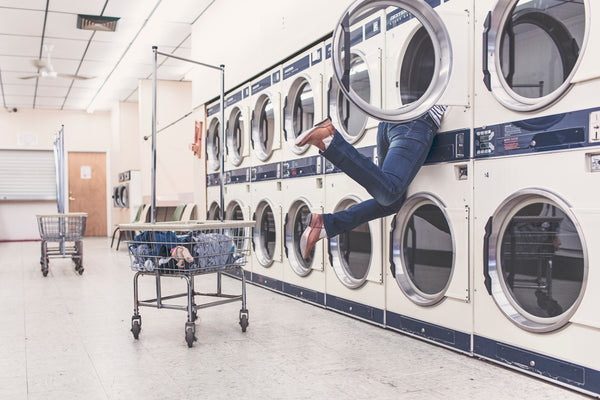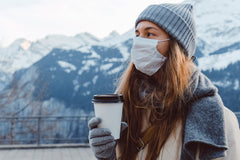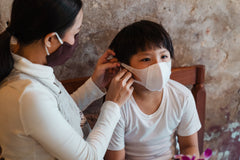Managing Laundry in Corona Times: FluShields Talked To Experts If The Virus Stay On Clothes And What Detergents Are Best To Disinfect Laundry
 Photo by Gratisography from Pexels
Photo by Gratisography from Pexels
Although washing clothes is always imperative, it is even more critical during the novel coronavirus outbreak, scientists say. We know to practice safe social distancing and frequently wash our hands to protect ourselves and our loved ones during the coronavirus pandemic — but how about our clothes?
While laundromats are included in the list of essential businesses that should remain open, many across the country are restricting hours and services in an effort to control costs and reduce the socialisation that spreads the Corona virus. Many laundromats have also stopped all self-service laundry in an attempt to keep the facilities as clean as possible. Business has been a bit slower as people avoid going out. People are worried about access to their usual laundromat. They started to stocked up on detergent just in case they need to do laundry at home. It will be inconvenient to have to wash it by hand, but people are running out of options.
Let's check what the officials say about washing clothes:
According to the Center for Disease Control and Prevention (CDC), the coronavirus may live on a variety of materials, including clothing like your mask (i.e. N95 respiratory mask), for varying periods of time. But there is no proof that clothes are a source of exposure to the Corona Virus. The CDC recommends that hands be washed immediately after handling any dirty laundry. If possible, it recommends that people not shake any dirty laundry, which would cause the virus to disperse. It also says to follow manufacturer instructions, but try to use the warmest possible setting for the water, and to make sure to dry all clothes completely. Once the laundry is completed, clothes hampers should be cleaned and disinfected, the CDC says. Disposable bag liners or washable laundry bags are recommended as well.
Good news: You can actually protect yourself from viruses by wearing an FFP3 or N95 respiratory mask: Get your N95 respirator masks for the whole family today.
Though much remains unknown about the novel COVID-19 virus, the Centers for Disease Control and Prevention (CDC) currently states that the viral disease is most frequently transmitted from person to person via respiratory droplets, such as when an infected person coughs or sneezes within about six feet of close contacts.
As for managing laundry during the ongoing outbreak, the CDC advises that households with confirmed or suspected cases of COVID-19 follow these instructions when cleaning clothes, linens, towels and other items that go in the wash. Please remember to also wash your N95 respirator mask at least once a week and change the filters daily:
- Wear gloves when touching a sick person’s laundry. Disposable gloves should be discarded after each use, while reusable gloves should not be used for purposes beyond disinfecting and cleaning surfaces of COVID-19.
- Don’t shake out dirty laundry. This reduces the possibility of the virus dispersing through the air.
- You can wash a sick person’s laundry with other items. Follow manufacturer’s instructions when washing laundry, and use “the warmest appropriate water setting” for the items if possible, the CDC said. Then, dry items completely.
- Keep hands clean. Wash hands immediately after taking off gloves. Recycle with plastics if possible. If you’re not using gloves when handling the dirty laundry, properly wash hands afterwards. Using portable or stationary hand sanitisers reduce germs when traveling or when washing hands is not an option.
- Keep hampers clean. After putting laundry away, clean and disinfect hampers following standard CDC guidance for cleaning surfaces. Regarding sanitary transport, consider using a disposable bag liner or a reusable bag liner that can be washed.
What about the detergents? How effective are they?
Disinfecting your home laundry can be done inexpensively, easily and without damage to the fabric. These four categories of products are safe for fabrics and are available at local stores. They are recognized by microbiologists at the USDA Textile and Clothing Laboratory. Follow the product's directions carefully and use the amount of disinfectant recommended on the product's label.
- Pine oil disinfectants: These are effective in hot and warm water, and can be used on both white and colored fabrics. Some brands include Pine-Sol, Spic-n-Span Pine, and Lysol Pine Action. They should be added at the beginning of the wash cycle. To be effective, the product must contain 80 percent pine oil.
- Phenolic disinfectants: These are also effective in hot and warm water and can be used on white and colored fabrics. Lysol brand disinfectant is available in most areas. Phenolic disinfectants may be added to the wash or rinse water if the rinse water is warm.
- Liquid chlorine disinfectants (sodium hypochlorite): Also known as chlorine bleach, it may be used in hot, warm or cold water temperatures on white fabrics only. To be effective, there must be a 5.25 percent to 6.15 percent concentration of sodium hypochlorite. Not all chlorine bleach formulas are that strong, so read the labels. Examples of liquid chlorine bleaches include Clorox and all supermarket house brands.
- Quaternary disinfectants: These are extremely effective in all water temperatures but is less readily available than the other products. Lysol and Clorox offer quaternary formulas, as well as other brands. The Amway company manufactures Pursue, which is not recommended for laundry but can be added to the final rinse by following the dilution rate per gallon of water recommended on the label. Many household cleaners contain effective disinfecting ingredients but are not recommended for laundry purposes because they can damage fabrics.
Note: Oxygen-based bleaches (OxiClean, Clorox 2, OXOBrite are brand names) do not provide disinfectant qualities when used in home laundry processes.
Good news: You can increase protection from airborn bacteria and viruses by wearing an FFP3 or N95 respiratory mask. Join our rewards programm and share the news with your friends: Get your N95 respirator masks for the whole family today.
Please note that FluShields can only pass on general information and cannot make any guarantees or be liable for any consequences of your decision making or behavior. Use good common sense and ask your health care provider or physician for advice.
Thanks for stopping by.Please leave your comments, ideas or feedback below so we can continue to provide your with great content.
Join Airbnb and get up to $50 off your first trip!






